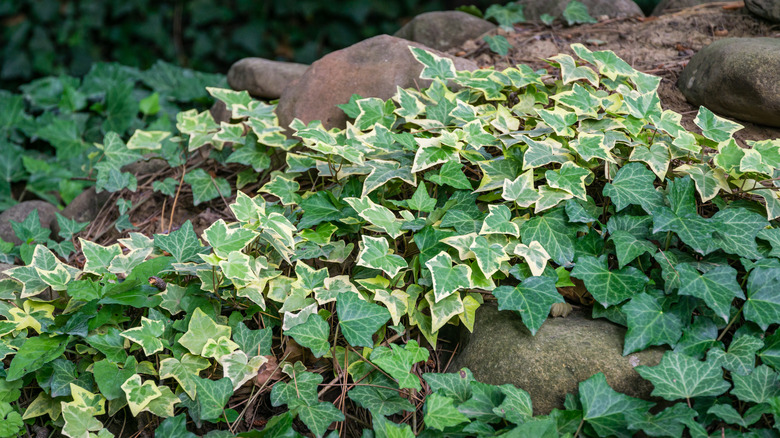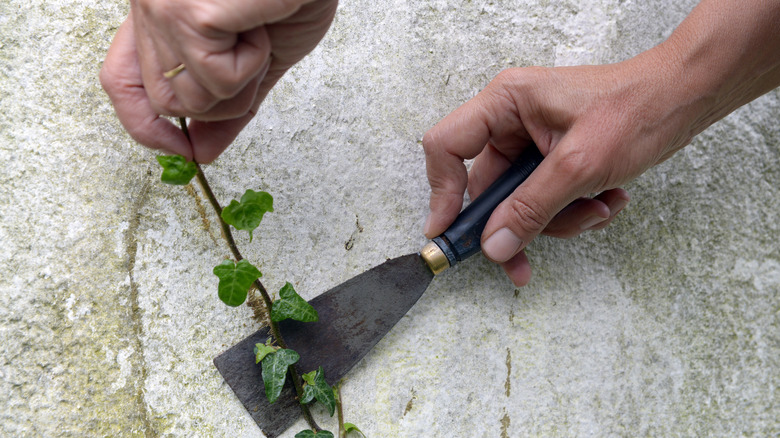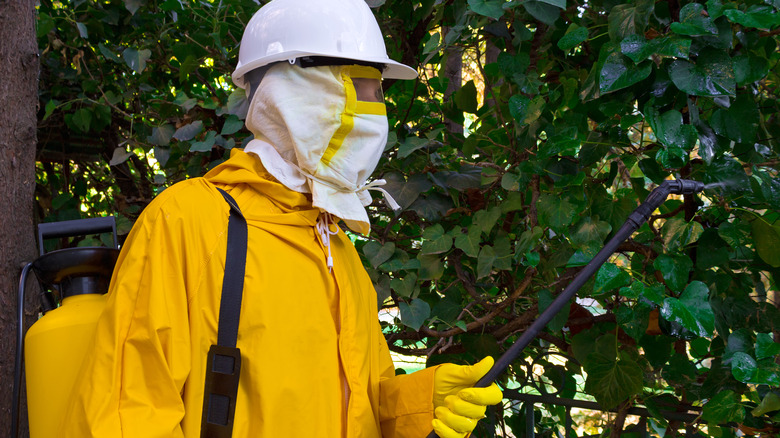How To Get Rid Of English Ivy If It Takes Over Your Garden
We may receive a commission on purchases made from links.
Few other things feel more quintessentially English than the sight of an ivy-wrapped cottage nestled amidst rolling green fields. Enter English ivy, elegantly christened Hedera helix, a species hailing from Europe, western Asia, and northern Africa. Draped in a glittering cloak of shiny, lobed leaves, this climber's small, inconspicuous greenish-yellow flowers make a modest appearance in summer and fall. But while lauded for its aesthetic prowess, English ivy turns from beauty to beast once it takes over your garden.
Picture a thriller, only this time, the fast-spreading antagonist isn't a serial killer but a vine, winding its way around shrubs and trees, slithering on the ground, strangling and stealing from native flora. Factor in potential structural damage to your house, and you've got quite a formidable invasive plant. So, there you are, wondering how to get rid of English ivy permanently.
Multiple approaches work well for removing English ivy, including manual methods like pulling out plants by the roots and chemical treatments ranging from pet-safe organic options to potent herbicides available in garden supply stores.
Getting rid of English ivy from garden without chemicals
Getting rid of English ivy often starts with the test of endurance — hand pulling. Show that green trespasser who's boss by yanking the vines out individually to minimize disturbance to soil and native plants. You can enlist the help of a sturdy rake for areas boasting thick ivy mats. It won't aid much in the root extraction, but it will undoubtedly clear the path for your fierce hand-pulling battle. Now, onto digging out roots. With a spade in hand, dig under each root and pry it up, exposing the depths of the ivy's influence. Multiple attempts may be necessary.
For tree-climbing ivy, unleash your cutting prowess. Choose from your arsenal of pruning saws or hand pruners, depending on the ivy's age and girth. Finesse matters here: rather than tugging at the vines, gracefully snip them away, preserving the tree bark's integrity. Chop supple vines at chest height and aim for the base if dealing with more robust ones. "But how do I keep English ivy from growing back?" you might ask. Treating the pruning wounds with a concentrated glyphosate solution could be your secret weapon in halting regrowth. And finally, for the patient garden warriors, invoke the sun's almighty power for solarization. This involves covering the area with black plastic and then letting the sun cook the invasive plant to submission — a process that will take one to two years.
Chemical control methods for English ivy
English ivy wears its waxy leaves as an armor stubborn to many herbicides. Enter a mower or a string trimmer like the BLACK+DECKER String Trimmer available on Amazon, which will chop the leaves, creating open wounds that make the plants vulnerable to your chemical assault. For the cautious gardener wondering how to get rid of English ivy from the garden naturally, household white vinegar reinforced with dish soap is a valuable ally. Unleash your vinegar mixture generously, targeting the invasive plant's roots and the surrounding soil. A spray bottle or garden sprayer will suffice here.
Up next are the herbicides. In addition to glyphosate, the typical mention in gardening advice around broadleaf weeds, you can try imazapyr or triclopyr. Don proper PPE to avoid injury — safety goggles, gloves, a long-sleeve shirt, and pants. In addition, launch your attack during cooler weather to minimize evaporation, giving the herbicide more time to breach and conquer.
After a week of either vinegar or herbicide warfare, launch a post-battle survey. Brown (dead) ivy indicates victory. Uproot and dispose of the battlefield's fallen in a sizable garbage bag. However, don't wave the white flag if the ivy remains green and defiant. Reload and launch a second offensive.


